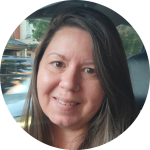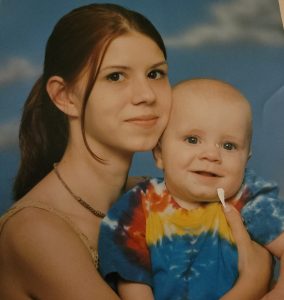 When Natasha McCall walked through the doors of The GateHouse the day after Christmas in 2018, she didn’t know she was entering the place that would transform her life. She had other plans … and those plans included palm trees and sunshine.
When Natasha McCall walked through the doors of The GateHouse the day after Christmas in 2018, she didn’t know she was entering the place that would transform her life. She had other plans … and those plans included palm trees and sunshine.
“Right when I got there, I told my counselor I was going to Florida,” she said. “I said coming to The GateHouse was just a temporary insurance thing.”
But the only program that accepted her was The GateHouse. And, as it turns out, that was exactly where she needed to be.
A Childhood in Turmoil
Natasha’s story begins in a whirlwind of instability.
By the time she entered kindergarten, she and her mother had moved 12 times. She was raised amid emotional chaos by a mom whose fear of the Rapture colored every corner of their world. Shuffled between her mother’s religious fervor and her churn of romantic relationships, Natasha was often left to her own devices.
Her first drink came at age 11, handed to her by a family member.
“I didn’t even really understand how it made me feel,” she said. “I just liked that I fit in. I didn’t feel self-conscious. I didn’t have to feel my feelings.”
What started with alcohol quickly escalated to hallucinogens, pills, and even heroin—all before she was even 16.
“It just kept progressing,” she said. “And it didn’t stop for 25 years.”
Motherhood at 15
 At just 15 years old, Natasha became a mother and immediately felt the weight of responsibility settle on her shoulders. She was desperate to provide some sense of stability for her newborn son.
At just 15 years old, Natasha became a mother and immediately felt the weight of responsibility settle on her shoulders. She was desperate to provide some sense of stability for her newborn son.
“So, I did what any 15-year-old trying to build a family might think to do,” she said. “I got married.”
The marriage wasn’t to her child’s father, but to a 19-year-old man she barely knew. The relationship was rocky from the start. Both were struggling with substance use, and Natasha was still a child herself. The marriage lasted just six months.
“I had just turned 16 when we got married, and it ended that December,” she said. “It was like we were just playing house. We had no idea what we were doing.”
Still, Natasha tried to do the right thing. She got her GED, became a nurse’s aide at 17, and tried to raise her son with whatever stability she could muster.
Then, tragedy occurred. When her son was four, his biological father suddenly reappeared and took Natasha to court to gain visitation rights. On his very first overnight visit, the boy’s father abused him. It was a significant enough event that the man was arrested, convicted, and sentenced to 20 years in prison.
The experience was devastating for Natasha.
“I was already doing everything I could just to survive and be a good mom,” she said. “But that moment broke something in me. It was one of those things you don’t bounce back from—you just carry it differently.”
Transitioning to “Adulthood”
As she entered her 20s, Natasha did her best to cope. She kept working, raising her son, and searching for some semblance of order in her life. But the stability she longed for always seemed just out of reach.
Amid the chaos, she leaned on something she thought was safe: prescription medication.
“I figured if it was prescribed, it had to be okay,” she said. “I was taking Xanax, Valium, painkillers—whatever the doctor gave me. Every day.”
To the outside world, it looked like she was functioning. She had a steady job, paid the bills, and tried to keep life moving forward. But underneath it all, the pills were helping her maintain a fragile version of normal.
“I wasn’t partying,” she said. “I was surviving. But I can see now that I was abusing those meds. I just didn’t want to feel anything.”
By her 30s, things began to unravel. Her substance use disorder was no longer something she could control or conceal.
“I was getting high at work,” Natasha said. “I was missing events. Stealing from jobs. It was constant.”
Hitting Bottom
Even as her life spiraled, Natasha kept trying to “fix” things on her own. She swapped one substance for another, moved from place to place, all the while going on and off methadone.
A turning point came when her mother became gravely ill.
In the hospital for months, her mother’s health issues coincided with Natasha’s own deepening spiral. Sleeping in cars, staying with drug dealers, and ultimately losing a pregnancy due to her inability to stay clean, Natasha found herself homeless and alone in a Rutter’s parking lot.
“I had no money, no drugs, no one to call,” she said. “Weirdly, I had an NA book in my glovebox. I don’t know why. I really don’t. But I started reading.”
She picked up the phone and called Cove Forge. They had a bed. She went that same night.
“You have to understand—that never happens,” Natasha said. “You don’t just call a place like that and get a bed the same day. It honestly felt like divine intervention. Like something—someone—wanted me to live.”
The GateHouse Changes Everything
Although she had been to Cove Forge before, Natasha had never stayed through the program. But this time, something was different.
“I just knew I couldn’t go back to the life I was living,” she said.
 She completed detox, stayed for rehab, and entered the partial program. Her next plan? Florida.
She completed detox, stayed for rehab, and entered the partial program. Her next plan? Florida.
“My plan was to go recover in Boca Raton,” she said, laughing. “I thought I’d start fresh in the sunshine, maybe stay with my sister. That was the dream.”
But her insurance had other ideas—it required her to stay in Pennsylvania. She applied to several halfway houses across the state. All of them turned her down.
Except one.
“The GateHouse was the only place that said yes,” Natasha said. “And honestly, it was the best ‘no’ I ever got.”
When the doors of The GateHouse opened to her on that cold day in December, Natasha had no idea what she was walking into.
“I thought I’d just be living in a house, going to some meetings,” she said. “Instead, they handed me a chore list and told me I had to cook dinner for 27 women.”
A Moment of Truth
Despite the challenge, she leaned in.
“It was like everything I missed in childhood,” Natasha said. “There was a routine. I had responsibilities. But I was a part of something. I learned how to make my bed, do my own laundry, and be accountable.”
She stayed in Residential Extended Care for four months before progressing to Gatehouse Transitional Living. There, she found not just recovery—but clarity, purpose, and connection.
After her time at The GateHouse, Natasha moved to Columbia, PA, and things began to shift. She entered a relationship and moved in with a partner who was still actively using. The environment became toxic, and Natasha found herself slipping away from the practices that had kept her grounded.
 “I wasn’t calling my sponsor. I wasn’t going to meetings,” she said. “I was still trying to hold things together, but I wasn’t doing the work.”
“I wasn’t calling my sponsor. I wasn’t going to meetings,” she said. “I was still trying to hold things together, but I wasn’t doing the work.”
Eventually, she relapsed, and, probably due to her long period of abstinence, she overdosed.
Fortunately, her best friend, whom she had met during her time at The GateHouse, was also living with them at the time. Unlike Natasha and her partner, Natasha’s friend was still in recovery and wasn’t using. She was the one who stepped in.
“She gave me Narcan and did CPR,” Natasha said. “She saved my life.”
The moment jolted her back into focus.
“That was my jarring experience,” she said. “It shook me awake.”
Natasha and her partner moved to the City of Lancaster, but within a few weeks her partner moved out and Natasha recommitted fully to her recovery. She attended 90 meetings in 90 days, reconnected with her sponsor, and rebuilt the structure she had learned during her time at The GateHouse.
Building a New Life
Today, Natasha is thriving.
While she still lives in the same apartment she moved into after recovery, she works full-time in accounting and is pursuing her bachelor’s degree in behavioral science, with plans to earn a master’s in mental health counseling.
Most importantly, she’s become a pillar of strength in her family. Her son—now an adult—is in therapy and navigating his own healing journey. Her sister has reduced her drinking. Even her mother has become more open about addiction and recovery.
“I went from being the cautionary tale to being the inspiration,” Natasha said.
Looking Forward
Natasha plans to become a therapist whose focus areas are trauma and substance use disorder. She’s already begun to use her story to help others.
“Recovery gave me the space to grow, to go through phases, and to be loved through them,” she said. “I missed a lot growing up. Now I get to reclaim that.”
The GateHouse is here for you—whether you need outpatient support, transitional living, or residential extended care programs. If you’re looking for help now, give us a call at 717-393-3215 or reach out to us today to get started.




